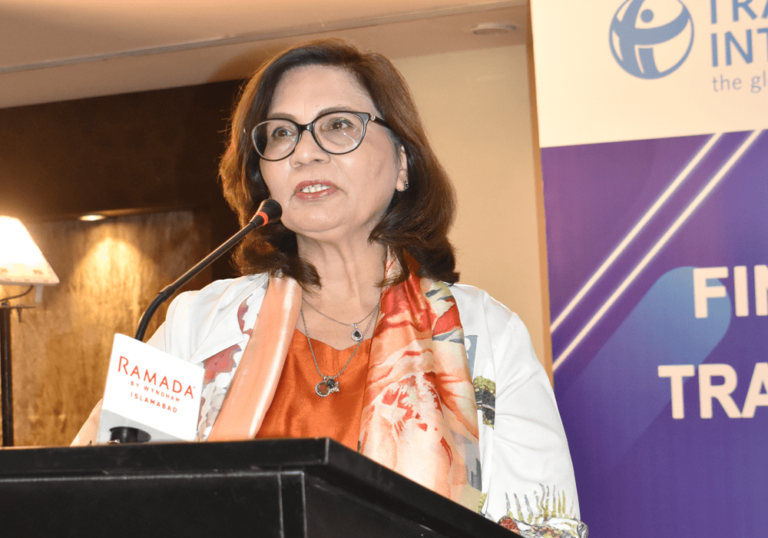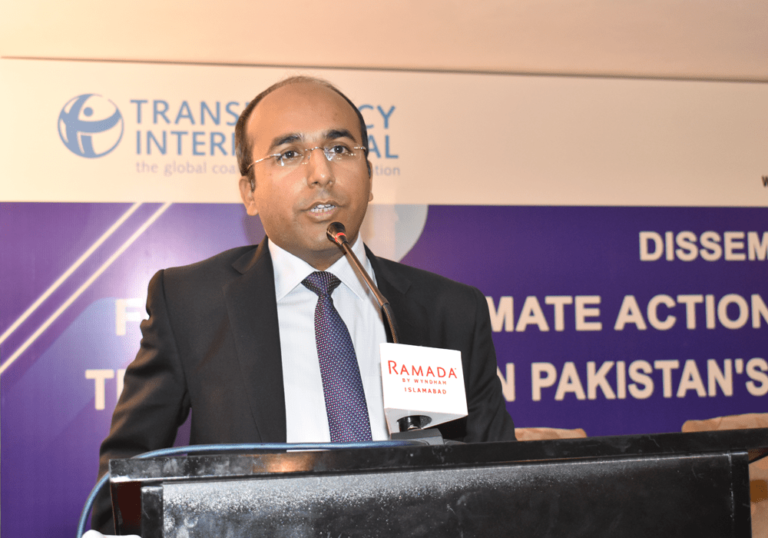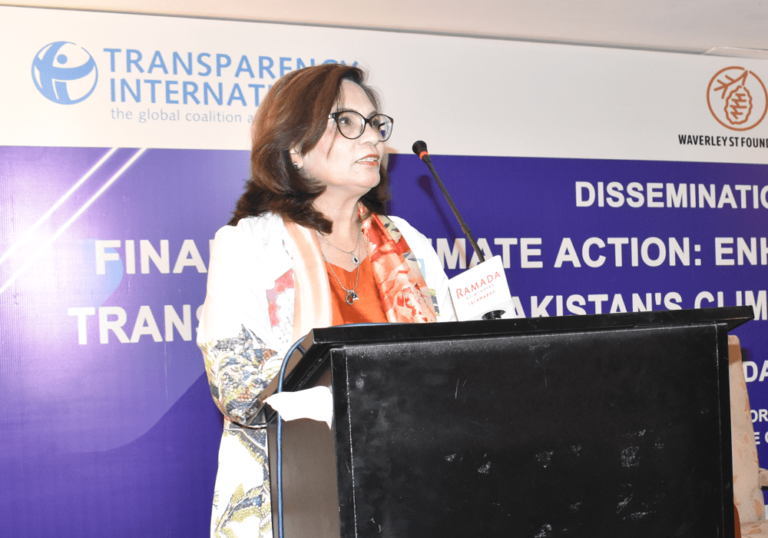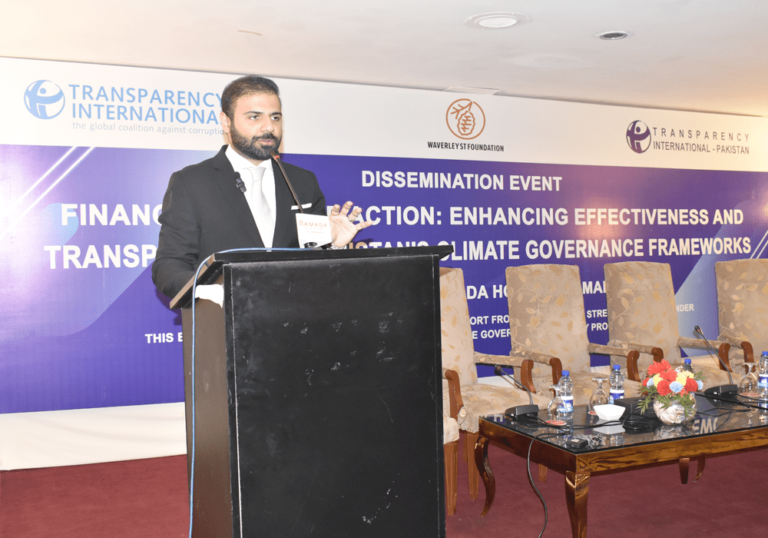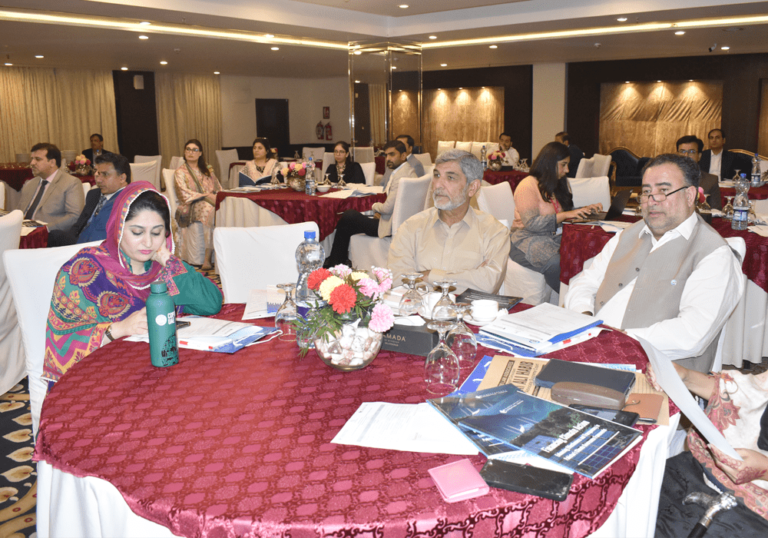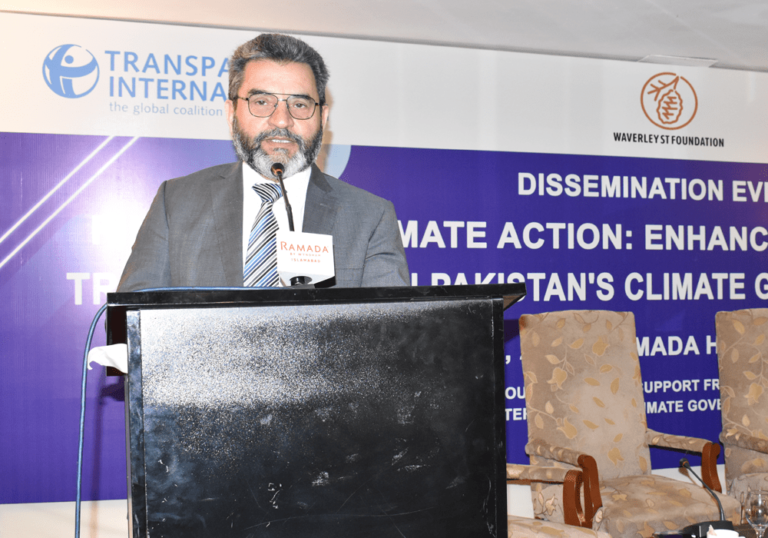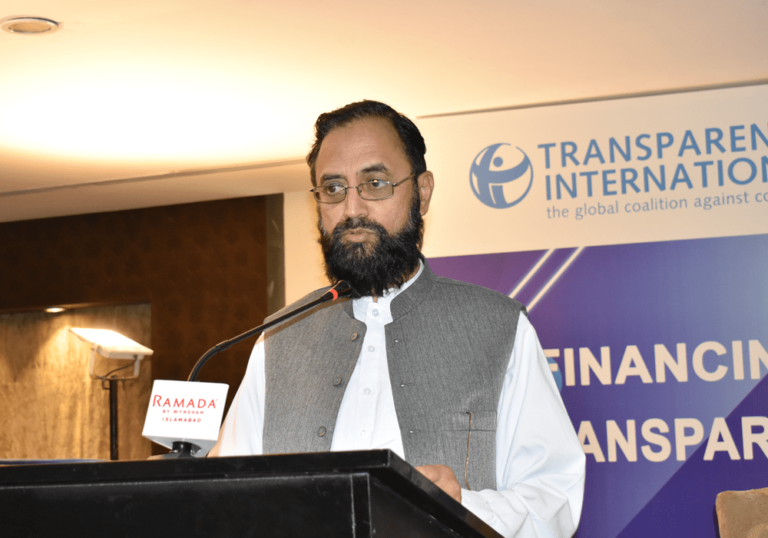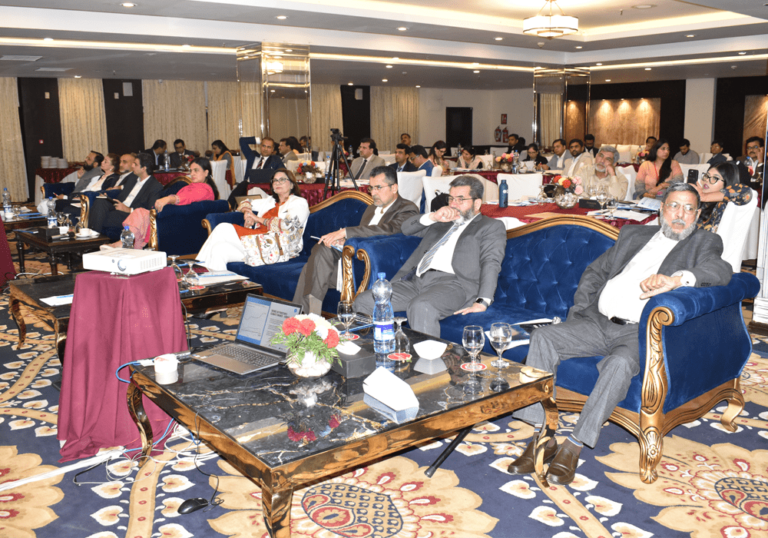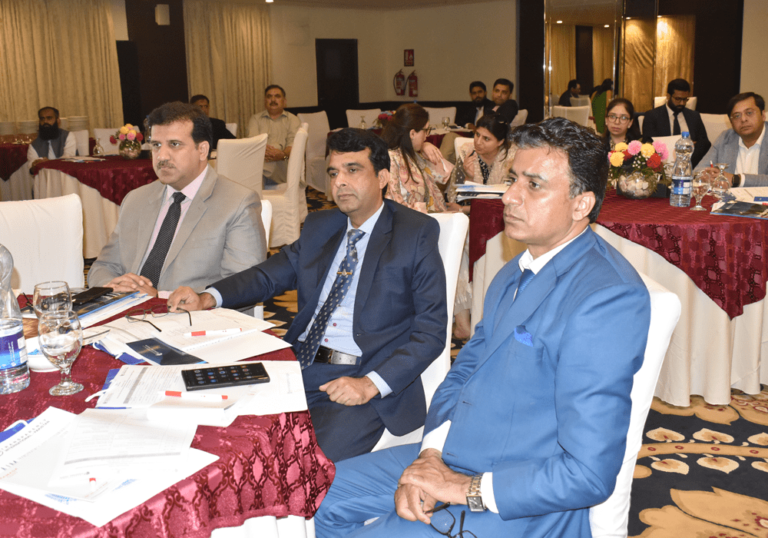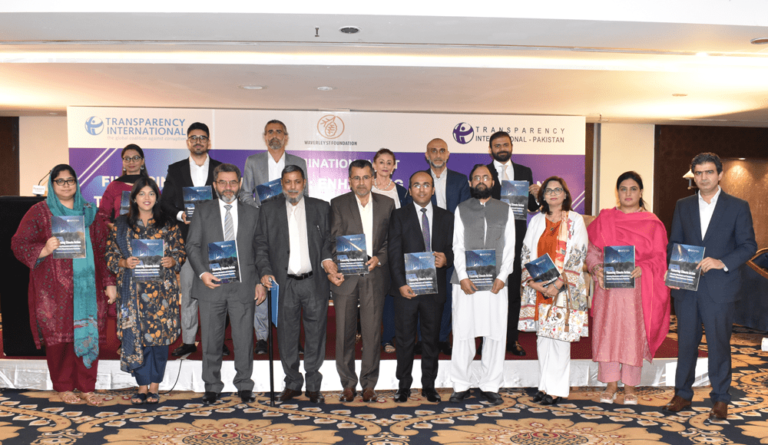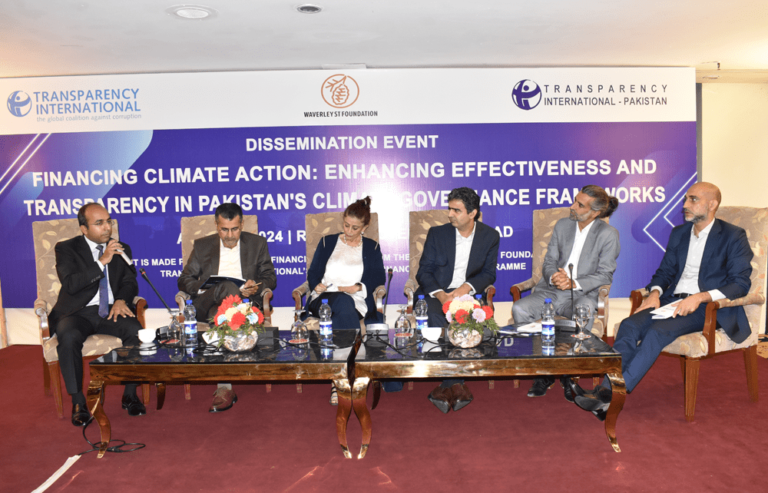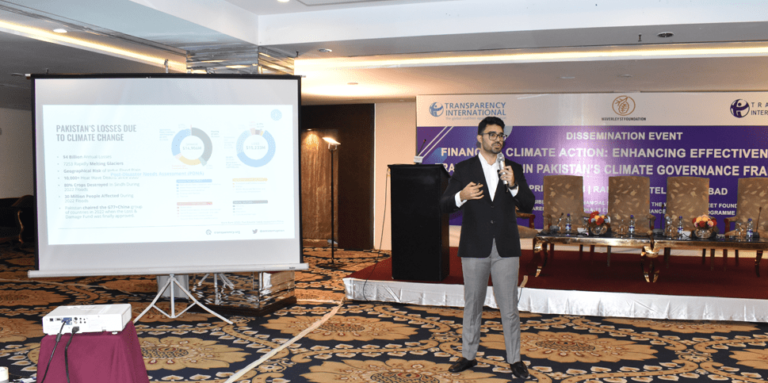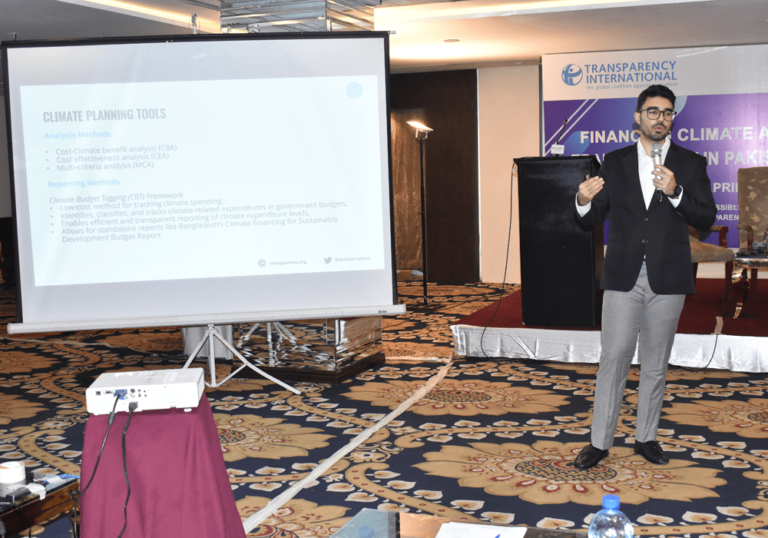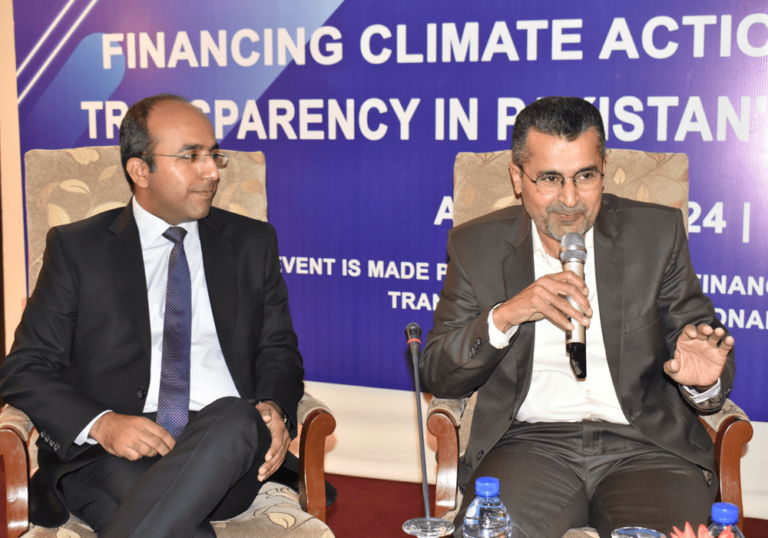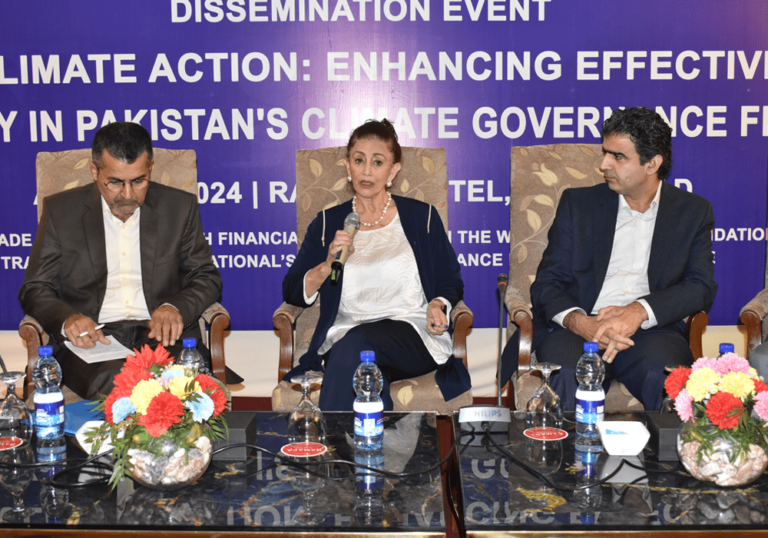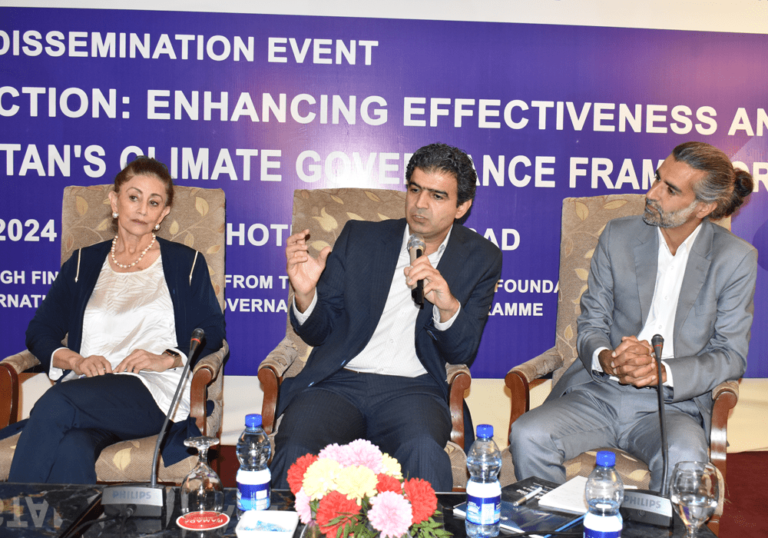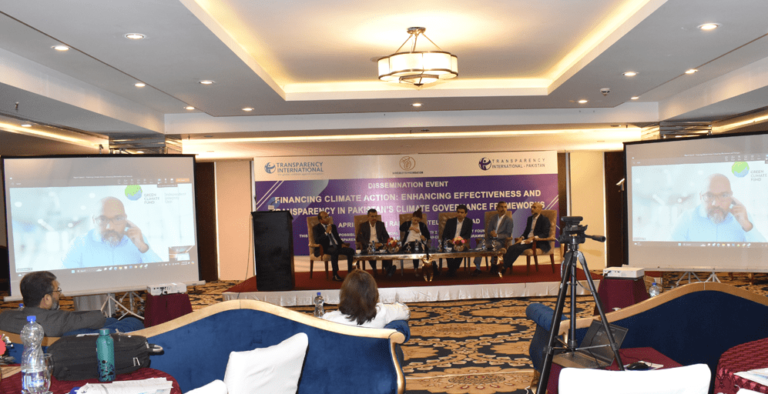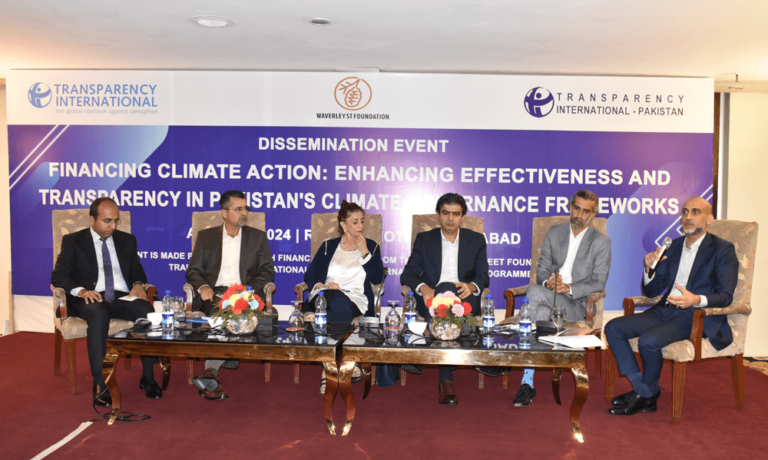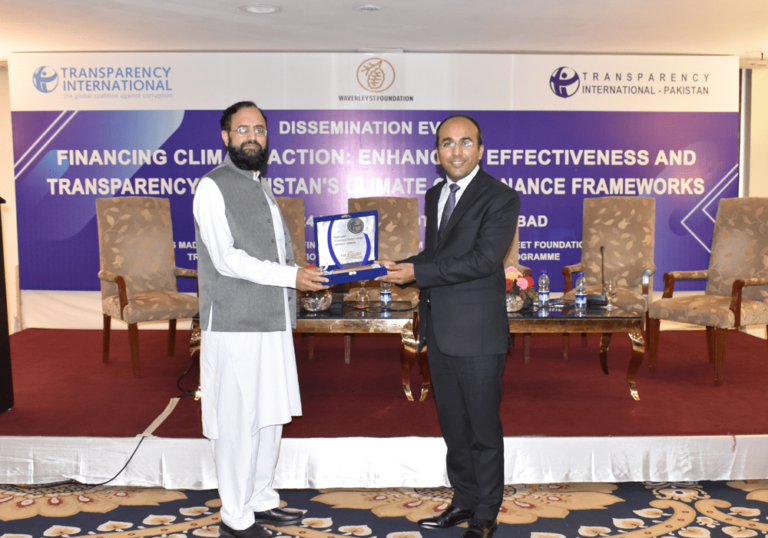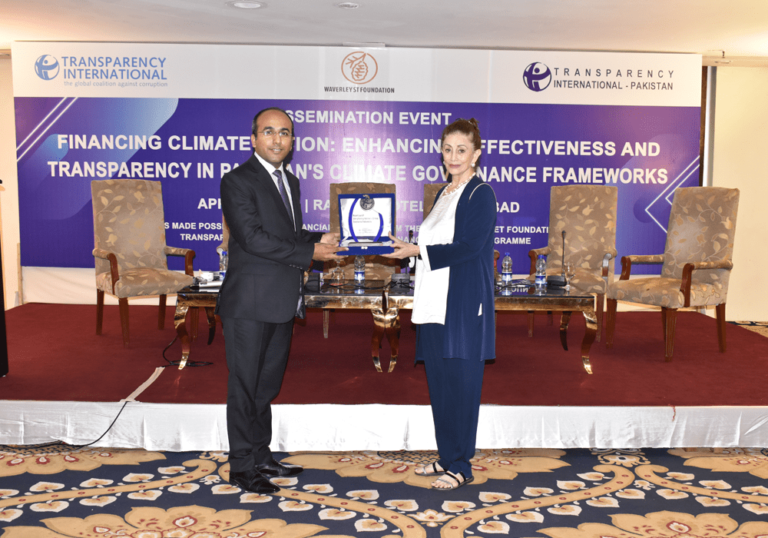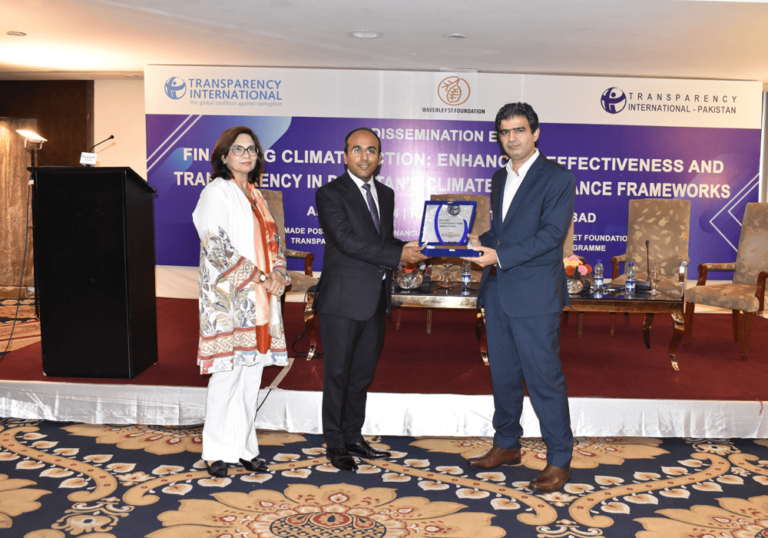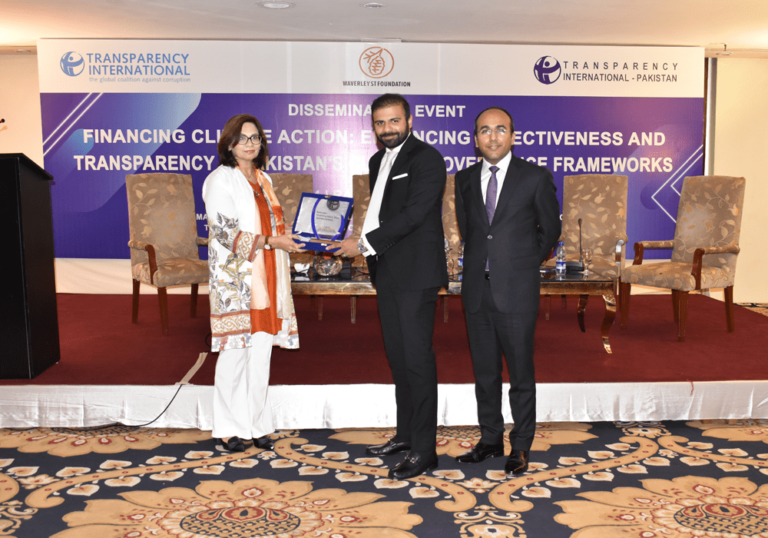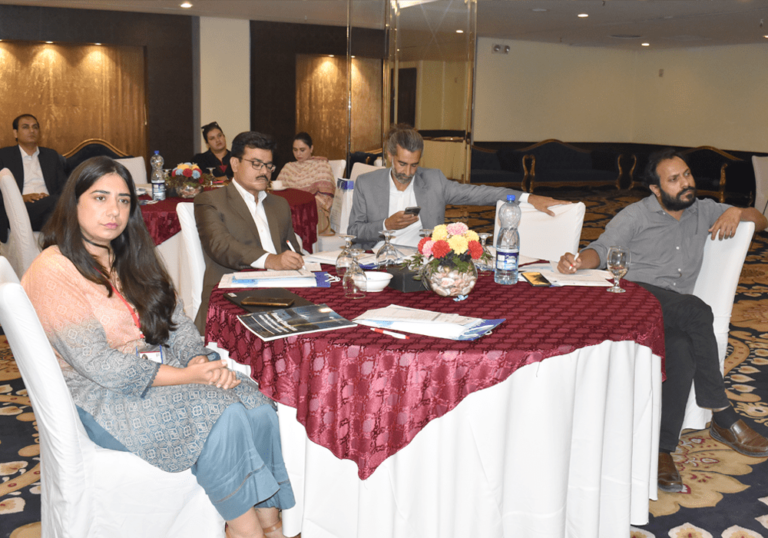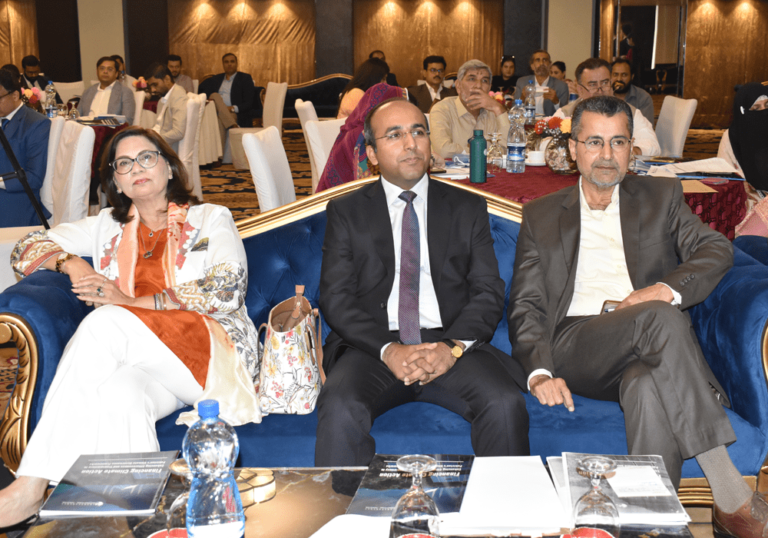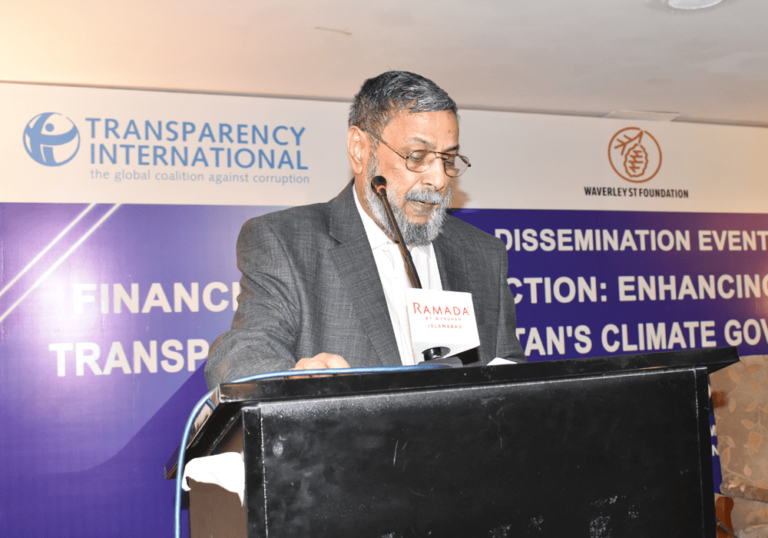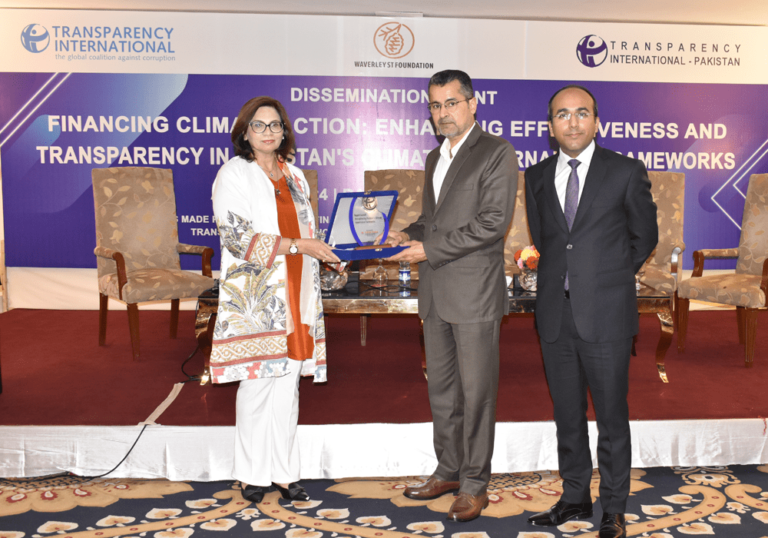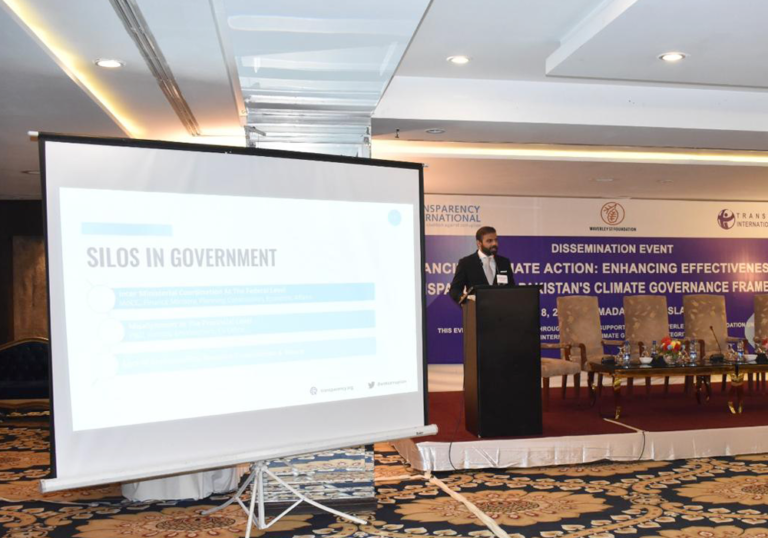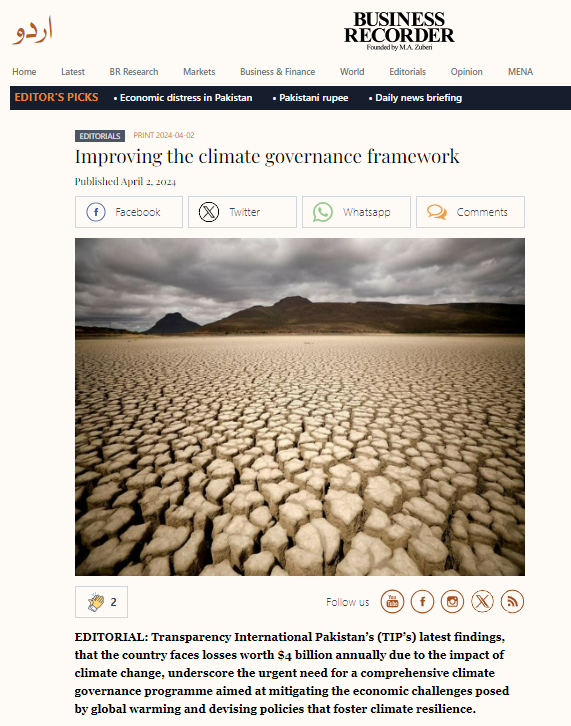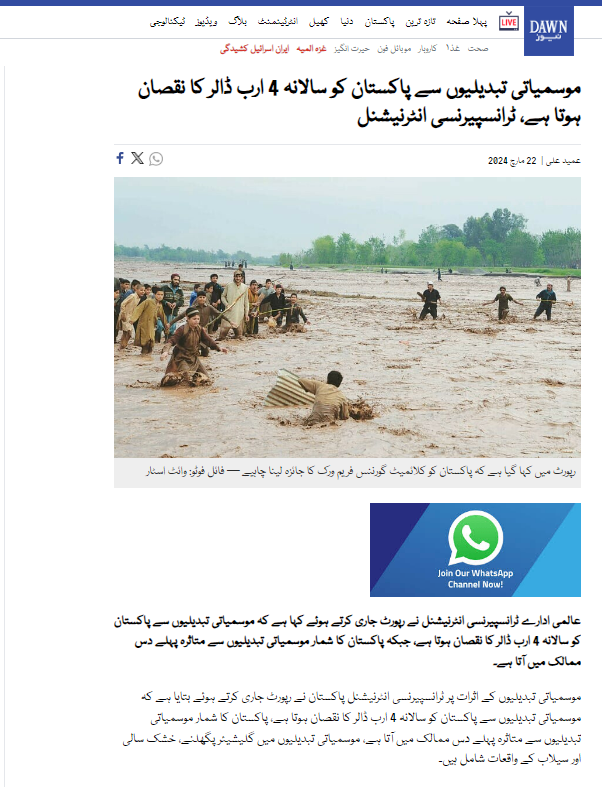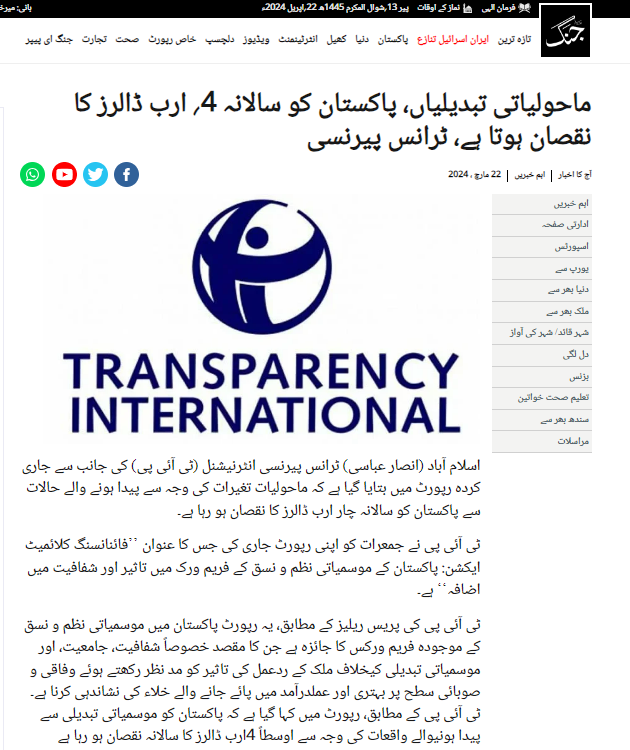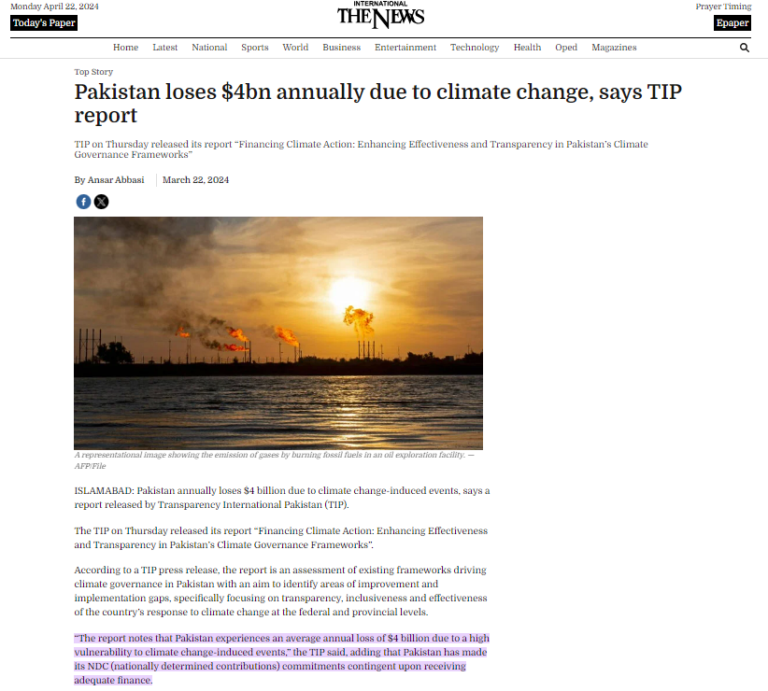- Home
- Dissemination Event – Financing Climate Action: Enhancing Effectiveness and Transparency in Pakistan’s Climate Governance Frameworks
Dissemination Event – Financing Climate Action: Enhancing Effectiveness and Transparency in Pakistan’s Climate Governance Frameworks
Dissemination Event – Financing Climate Action: Enhancing Effectiveness and Transparency in Pakistan’s Climate Governance Frameworks
Date: Thursday, April 18, 2024
Venue: Ramada Hotel, Islamabad
Transparency International Pakistan launched it report ‘’Financing Climate Action: Strengthening Effectiveness and Transparency in Pakistan’s Climate Governance Frameworks’’ on Thursday, April 18, 2024 at Ramada Hotel, Islamabad.
The launch and dissemination event was attended by senior representatives from Federal Ministry of Climate Change & Environmental Coordination, Federal Ministry of Planning & Development & Special Initiatives, Federal Ministry of Economic Affairs, Prime Minister’s Inspection Commission (PMIC), Office of Auditor General of Pakistan, National Accountability Bureau (NAB), National Disaster Management Authority (NDMA), Federal Right to Information Commission, Pakistan Public Procurement Regulatory Authority, Climate Change, Forestry, Environment & Wildlife, Department, Government of Khyber Pakhtunkhwa, Environment Protection Agency, Government of Sindh, The World Bank, Asian Development Bank (ADB), Green Climate Fund, Malala Fund, GIZ Pakistan, UNODC, WFP, International Union for Conservation of Nature (IUCN), Civil Society Coalition of Climate Change, Civil Society Organizations and academia
The report is an assessment of existing frameworks driving climate governance and climate finance in Pakistan with an aim to identify areas of improvement and implementation gaps, specifically focusing on transparency, inclusiveness, and effectiveness of the country’s response to climate change at the federal and provincial levels. In doing so, the report provides a roadmap that can guide improvements in climate governance integrity and catalyze Pakistan’s efforts to develop climate resilience and address climate effects.
Dr. Uzma Shujaat, Board of Trustee, TI Pakistan delivered welcoming remarks and highlighted that the report offers valuable insights grounded in rigorous research and analysis into how Pakistan can enhance the effectiveness and transparency of its climate governance frameworks.
Mr. Kashif Ali, Executive Director, TI Pakistan during the opening remarks gave an overview of TI Pakistan’s Climate Governance Integrity Program. He emphasized that Pakistan’s ability to build resilience depends on the effectiveness of the country’s climate governance institutions. He shared that TI Pakistan’s assessment shows that over the last 10 years on average Pakistan has received between $1.4 – 2 billion in climate finance from multilateral and bilateral sources. However, to ensure an effective access and utilization of climate finance, climate governance priorities need to be integrated into national development plans such as the long-term plans prepared by the Ministry of Planning, Development and Special Initiatives. He highlighted the need to align existing climate governance frameworks with international best practices so that the planning, budgeting, implementation and post implementation phases of the projects incorporate climate-relevant features.
Mr. Kashif also emphasized that climate vulnerability and corruption have a devastating relationship. This requires an awareness that corruption can pose a significant barrier and governance risks to climate change. He highlighted that within the existing Public Financial Management System of the country, the accountability is highly dependent on the Auditor General Office, hence, targeted capacity-building among auditors in order to include costing of emissions, abatement and offsets can shift reporting of adaptation and mitigation projects towards a more realistic representation. This information is also crucial when financial reports are to be presented to accountability bodies, such as the Parliamentary Public Accounts Committee, which needs to see the projects’ rationale. Other accountability and corruption-control bodies, such as the National Accountability Bureau (NAB) and Provincial Anti-Corruption Establishments (ACEs), also need capacity enhancement as climate-relevant projects and expenditures are likely to increase, strengthening transparency and accountability becomes crucial.
Next, Mr. Mekaeel Malik, CEO Climate Finance and Mr. Dawar Hameed Butt, climate consultant, and TI Pakistan’s expert researchers for the report presented key highlights and findings of the report. It was highlighted that three key problems namely Bureaucratic Obstacles, Transparency Enhancement, and Operational Streamlining hinders Pakistan’s national climate governance. They emphasized that there is a need to revoking immunity granted to the Climate change authority (Section 14) within Climate Change Act 2017 by introducing an appellate tribunal composed of independent climate change experts. At the same time, inclusive policy-making forums such as Climate Change Council need to be operationalized to ensure more consistent and proactive engagement.
Mr. Dawar further highlighted 10 recommendations presented by the report for federal and provincial governments as well as multilateral stakeholders to ensure effective access to climate finance and strengthen transparency and accountability Pakistan’s climate governance frameworks: These recommendations include: a) Operationalize absent institutions under the Climate Change Act 2017 b) A ‘whole of society’ approach which includes timely public consultations and expert participation in climate planning c) Integrate Transparency & Climate frameworks in project designs at planning and budgeting level d) Capacity Building of key auditing and reporting institutions, including corruption watchdogs e) Address policy lag between national and provincial Climate policies f) Provincial climate budgetary allocations in proportionate to the scale of climate crisis g) Compliance with Public Procuring Regulatory Authority (PPRA) Rule 47 h) Establish open database on Climate Finance i) Climate Governance scoring checklists for each province j) Complaint mechanisms and anti-corruption measures.
Afterwards a panel discussion “Bridging the Gap – Effective and Transparent Climate Governance in Pakistan” was held to reflect on the key highlights of the report for a more detailed discussion. The panel comprised of Mr. Waqar Hussain Phulpoto, Director, Environment Protection Agency, Government of Sindh, Mr. Albert Lihalakha, Deputy Head, Independent Integrity Unit (IIU), Green Climate Fund, Mr. Tobias Haque, Country Economist, The World Bank, Ms. Aisha Khan, CEO, Civil Society Coalition on Climate Change (CSCCC), Mr. Hiz Jamali, Senior Climate Change Officer, Asian Development Bank (ADB) and Mr. Shezad Abdullah, Focal Person – GCF Projects and Head of Investment Banking, JS Bank. The session was moderated by Mr. Kashif Ali, Executive Director, TI Pakistan.
Mr. Waqar Hussain Phulpoto, Director, Environment Protection Agency, Govt of Sindh emphasized on the robust data collection and monitoring mechanisms to have effective climate decision making. He said that without these foundational elements, informed actions towards financing climate action will remain hindered. He said national, sub-national and local coordination barriers need to be addressed along with enhancing budgetary allocations to bolster climate action initiatives.
Mr. Albert Lihalakha Deputy Head, Independent Integrity Unit (IIU), Green Climate Fund, said that countries like Pakistan are vulnerable to climate impacts and require substantial resources for adaptation and resilience. He emphasized that enhancing the capacity of institutions responsible for managing climate financing is critical. This requires strengthening key integrity areas such as auditing and reporting, adopting a uniform approach to reporting on climate spending, creating open database and open source information on climate finance, and producing additional accessible and understandable budget statements for ensuring transparency in climate finance He highlighted that other important area is the regulatory frameworks. Compliance with established procurement rules, anti-corruption measures, and control of audit mechanisms is fundamental in maintaining integrity in climate projects.
Mr. Tobias Haque, Country Economist, The World Bank, emphasized on mobilizing private sector investments in climate finance. He said that enabling environment and regulatory framework that allows or attracts local and foreign private investment should be encouraged because the resources are very less.
Ms. Ayesha Khan, CEO, Civil Society Coalition on Climate Change (CSCCC), said that whenever we look at finance, we need to look at it through the lens of the people and the policies. In Pakistan, a growing population is becoming a huge challenge, if we keep increasing our population, we will not be able to cope with climate challenges that we are facing. She highlighted the gendered vulnerabilities to climate change and said improving the gender dynamics in Pakistan doesn’t require much money to give women equal access and opportunities. If we keep half of our population under-optimized, underutilized, and not contributing or represented in the society, we will also not be able to cope with the financial gaps that we are facing.
She emphasized that it is very clear that public finance alone is not sufficient to tackle climate challenges. We need a good blend of public and private finance and innovative thinking out of the box on how to use that finance so that access, affordability and scale can be made available for our people.
Mr. Hiz Jamali, Senior Climate Change Officer, Asian Development Bank (ADB) briefed on the scenario of implementation of the climate mitigation and adaptation measures at federal and provincial level. He said that the consolidation of various mechanisms and strategies within Pakistan’s climate departments, as recommended in the report, could be a crucial step towards enhancing efficiency and coherence in addressing climate challenges. He said that climate department alone could not implement the mitigation and adaptation measures, it requires an integrated approach with finance, planning and health departments. He emphasized integrating coordination mechanism in country’s climate governance frameworks for an accelerated, and equitable climate action.
Mr. Shezad Abdullah, focal person – GCF Projects and Head of Investment Banking, JS Bank highlighted the need to encourage for incentives provided to private sector. He said that the State Bank of Pakistan has implemented incentives to promote solarization throughout the country, resulting in a notable reduction in solarization prices and a subsequent increase in investment in solar energy projects. These incentives have played a pivotal role in driving down the costs associated with adopting solar technology, thereby making it more accessible and attractive to both individuals and businesses.
Afterwards, Mr. Muhammad Masood, Special Secretary, Climate Change, Forestry, Environment & Wildlife Department, Khyber Pakhtunkhwa gave closing remarks. He provided a brief on the efforts of provincial government to tackle climate challenges. He said forestation projects in the province from 2014 to 2019 have increased the forest cover in KP by 6.5% and now it is the most forested province in the country. The Ten Billion Trees Tsunami Programme was recognized globally. Kp government spend 12% of its total budget on climate measures and has started 180 plus projects for implementation of NDCs focusing on climate adaptation and mitigation.
In the end, Mr. Hashmat Ali Habib, Advocate, Supreme Court of Pakistan and Board of Trustee, TI Pakistan, delivered vote of thanks. He extended gratitude to all distinguished guests and speakers for their contribution for encouraging effective and transparent climate governance in Pakistan. He said that the depth of discussion and collaboration showcased today underscores the urgency and complexity of climate action. We must heed the call to action articulated by our esteemed speakers and partners, redoubling our efforts to bridge gaps, enhance transparency, and mobilize resources effectively.


